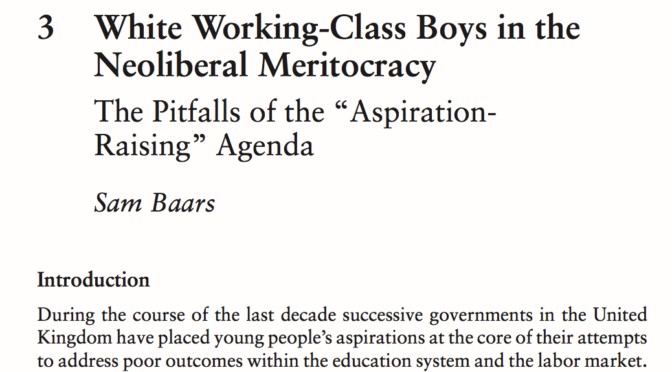I’ve just had a book chapter published as part of a collection on Masculinity and Aspiration in the Era of Neoliberal Education, edited by Garth Stahl, Joseph Nelson and Derron Wallace. The chapter is about white working class boys in the neoliberal meritocracy, and the pitfalls of the ‘aspiration-raising’ agenda. It’s available here on Google Books. Here’s a summary of my argument:
The great meritocracy
When she became British prime Minister in July 2016, the core narrative of Teresa May’s premiership was quick to emerge: “I want Britain to be the world’s great meritocracy – a country where everyone has a fair chance to go as far as their talent and their hard work will allow.” According to this notion of meritocracy, a just and fair society is one in which people’s outcomes are governed by two things: their skills, and the effort they are willing to exert.
‘Raising aspirations’
Young people’s aspirations (their desires for the future) play a key role in this view of society: if meritocracy requires people to work hard and use their talents, then it also requires that they are motivated to do so. Without ‘high aspirations’ there is no motivation to strive. For this reason, successive governments in the UK have focused on ‘raising’ young people’s aspirations, and this approach is key to oiling the wheels of the great meritocracy.
Neoliberal foundations
The policy focus on ‘raising aspirations’, and the underlying meritocratic ideal that outcomes are governed by hard work and ability, both have their roots in neoliberal thinking. As an ideology, neoliberalism demands that young people take responsibility for their life outcomes, they exercise free choice in governing those outcomes, and are willing to move freely in order to find the best use for their talents. However, despite their ideological unity there are fundamental tensions between each of these tenets of neoliberal meritocracy and the ‘raising aspirations’ agenda it has given rise to. These tensions are thrown into stark relief when we consider the experiences of white working class boys – a group singled out by Prime Minister May as demanding particular policy attention. My fieldwork with a group of white working class boys in an outer-urban estate in Manchester aimed to directly explore these tensions.
Mobility vs. identity
Firstly, the imperative to ‘raise aspirations’ often involves overriding young people’s place-based identities. For most young people, attending university and engaging with high-status professional, managerial and technical occupations requires some form of movement away from spatial, social, and cultural familiarities such as family, friends and neighbourhood. However, white working class boys often voice a strong attachment to their locality. Despite this, the neoliberal imperative to be ‘footloose’ is strongest for those in the most deprived contexts: young people attending school in areas with few highly skilled jobs and no nearby university face the greatest pressure to transcend their place-based identities in order to “get out” and “get on”.
‘High aspirations’ vs. individual choice
Secondly, a narrow definition of ‘high aspirations’ undermines the sanctity of individual choice. The neoliberal meritocracy holds that young people should be free to decide where they want their talents and hard work to take them. However, in reality the aspiration-raising agenda is highly prescriptive, with “high” aspirations defined narrowly in terms of pursuing higher education or high status professional occupations. This delegitimises aspirations that young people might have for local work, or to enter employment as soon as possible after completing compulsory education – a common thread linking the white working class boys that participated in my research.
‘Success for all’ vs. opportunities for the few
Thirdly, the neoliberal notion of meritocracy puts forward a vision of “success for all” with unlimited space at the top for people to fill, as long as they have sufficiently high aspirations, hold the requisite talents and are willing to work hard enough. However, this underplays the reality that there are finite positions at the top of the educational and occupational hierarchy and that ruthless sorting will necessarily take place. This sorting process favours those from middle class backgrounds, who have access to particular forms of social and cultural capital such as unpaid internship experience.
A harmless discourse with harmful consequences
The neoliberal meritocracy is based on principles that are, at face value, laudable and uncontroversial: the importance of seeking opportunities wherever they might lie, the sanctity of young people’s individual choices and the belief that all young people can achieve success. However, the ‘aspiration raising’ agenda which lies at the heart of this neoliberal view of meritocracy sits in stark tension with these underlying principles. It also exposes how an outwardly innocuous discourse can impose particularly negative side effects on the most disadvantaged young people. The aspiration-raising agenda opposes key elements of individual identity, discredits aspirations for material security and family life, and paints a mirage of “success for all” even though educational and labour market outcomes continue to be largely dictated by socioeconomic background. These effects are arguably felt most starkly by white working class boys. They are the group who will benefit least, not most, from the neoliberal notion of meritocracy and its aspiration raising agenda.
Masculinity and Aspiration in the Era of Neoliberal Education is available here.
This blog was reblogged on The Sociological Imagination, where you can find summaries of the other chapters in the book.
